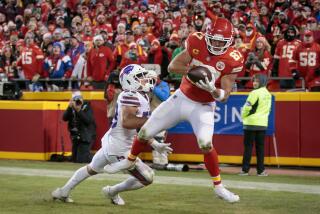Bad Time for Game to Start
- Share via
The NFL will discriminate against sports fans in Los Angeles and elsewhere in the West this year when “Monday Night Football” kicks off at 5:20 instead of 6:07 p.m.
Most of us aren’t home from work at 5:20, as the late commissioner Pete Rozelle well knew.
Thus, a quarter-century ago, Rozelle insisted on Monday night kickoffs at 6--or shortly after--in Los Angeles, which in New York is 9 p.m.
The problem is that New York TV people and others there have always wanted 8 p.m. football. They hate to wait till 9 for the start and hate to stay up past midnight for the end.
Rozelle, however, kept fighting them off. And until recently, so had successor Paul Tagliabue.
But the league’s 30 club owners have the last word on TV money, which they collect by the millions, and they finally caved in.
Rozelle used to say, “New Yorkers can see every minute if the game starts at 9. There’s no way that Californians can see it all if it starts at 5.”
With four time zones involved, someone, obviously, gets shortchanged on Monday nights. In New York, midnight is pretty late for football.
But at least if people want to watch the game, they can.
In the West except on Labor Day, if it kicks off at 5:20, they can’t.
*
PACK VS. PITTSBURGH: As of this week, two things are already known about the players who will win Super Bowl XXXIII next Jan. 31:
* They will do it in the West Coast offense.
* They will do it with a superb quarterback and a stable ground game, with a runner like Eddie George, and a passer like Jeff George.
Teams using Bill Walsh’s West Coast principles have won the last six Super Bowls and eight of the last 10.
What we’re talking about here is the trend of the ‘90s, a trend that has been sustained by superior passers combining with superior running backs to maintain a continuous first-down pass-run threat.
The essence of the West Coast system, in which most pass plays are closely timed, is the will to throw on first down. A principal objective is ball control with passes, most of them quickly thrown.
Of the several teams doing it that way now, two are the Green Bay Packers and Pittsburgh Steelers. And my guess is that in the Super Bowl this time, Green Bay will outlast Pittsburgh, 31-20.
That is the average score of the last three championship games, in all of which there has been, on both sides, excellent passing and defense.
This year’s candidates:
Green Bay, with mostly young players, is 1-1 in the last two Super Bowls. Quarterback Brett Favre is the model for the industry. Running back Dorsey Levens is a 230-pound sprinter. The weakness is the defensive line, but the club’s strength is defensive coordinator Fritz Shurmur.
Pittsburgh has had everything in recent years but a modern, West Coast offensive coordinator. And now, it has that with Ray Sherman, who learned the system in Minnesota and San Francisco. The running back is “the Bus,” Jerome Bettis. The future is Kordell Stewart, the NFL’s premier pass-run quarterback. No other football team has Pittsburgh’s three-way threat: Bettis left, Stewart right, threatening run or pass.
The only question is whether Stewart beats the NFC this time up or next.
*
TOP TEAMS: Two of the league’s best new coaches are Tom Coughlin of the Jacksonville Jaguars and Tony Dungy of the Tampa Bay Buccaneers. And overall, conceivably, the best two teams are the Denver Broncos and San Francisco 49ers.
So it won’t be an upset if any of those four organizations outlasts Green Bay and Pittsburgh in the Super Bowl run.
Indeed, the race in the AFC Central, Pittsburgh versus Jacksonville, could be the season’s most spectacular, with the possible exception of the race in the NFC Central, Green Bay versus Tampa Bay.
Others in the NFL’s top 10 today are the Kansas City Chiefs, New England Patriots and Tennessee Oilers of the AFC, and the Minnesota Vikings of the NFC.
More to Read
Go beyond the scoreboard
Get the latest on L.A.'s teams in the daily Sports Report newsletter.
You may occasionally receive promotional content from the Los Angeles Times.










